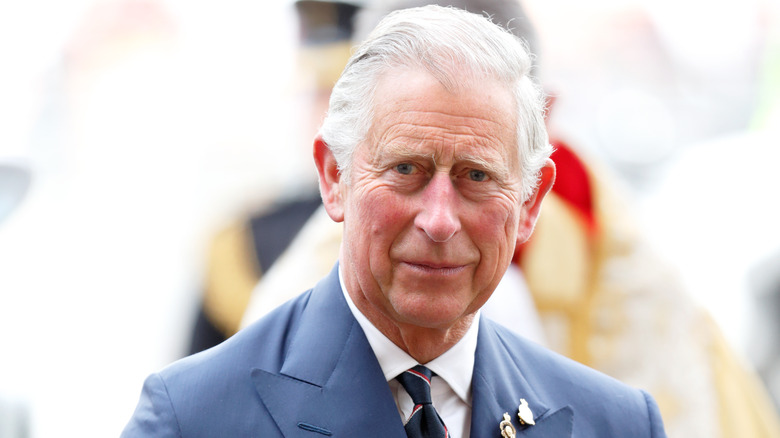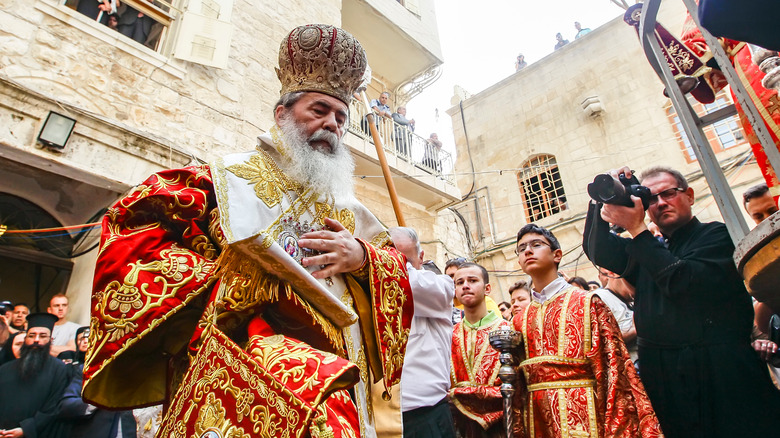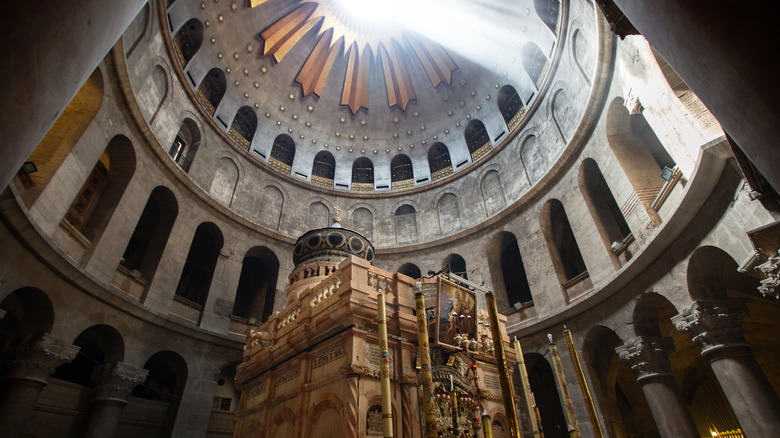Why The Holy Oil Used In King Charles' Coronation Is So Important
It's said that water and oil don't mix, but in religious circles water and oil of the holy type go together just fine. While holy water might be more commonly known — as well as favored by fictional vampire hunters everywhere — holy oil is used in a variety of rituals by a number of Christian churches: Roman Catholic, Eastern Orthodox, Mormonism, Lutheranism, and yes, Anglicanism. And when King Charles III is crowned England's new monarch on May 6, 2023, he will also be crowned the head of the Church of England, aka Anglicanism.
Many recount the tale of Anglicanism's origin as "King Henry VIII wanted a divorce," and that's that. While this did play a part, The Society of Archbishop Justus is quick to point out that the roots of Anglicanism start back before the 1054 C.E. split that gave us Roman Catholicism on one hand, and Eastern Orthodoxy on the other. So when Henry III officially founded the Church of England in 1534, he had a chance to develop a sui generis version of Christianity that picked this and that ritual as desired. It took decades for the specifics of Anglicanism to take root, like creating the Book of Common Prayer in 1549, changing Latin-language masses into English and enforcing their use in 1552, and so on.
King Charles III's holy oil, known by the arcane name "chrism oil," represents one such ritual. As ITV states, the Archbishop of Canterbury typically anoints a new monarch's "hands, breast and head" during the coronation.
Blessed in Jerusalem
King Charles III's holy oil wasn't just pulled from the extra virgin section of a store shelf and given a quick blessing. There's an extremely involved and serious process behind its production, right down to the location of the oil's olive trees. ITV describes the oil's creation at length, starting with two actual olive groves at the Mount of Olives, a location mentioned in the Bible that's sacred to Judaism, Christianity, and Islam. One of the groves was located at the Monastery of Mary Magdalene, and the other at the Monastery of the Ascension.
The olives were pressed "just outside Bethlehem," and their oil was mixed with a bunch of fragrances: orange blossom, rose, cinnamon, sesame, jasmine, and more. By all accounts the recipe is similar to that used for the coronation of King Charles III's mother, the late Queen Elizabeth II. As the BBC says, though, this particular batch is the first to be completely vegan and cruelty-free, a point made to satisfy the concerns of animal rights groups. Previous recipes used civet oil, a type of musk extracted from the glands of certain small mammals, and ambergris, a stony substance composed of cuttlefish and squid beaks that's vomited out by whales.
Before being sent to England, Charles' holy oil was blessed by the Patriarch of Jerusalem, His Beatitude Patriarch Theophilos III, the Anglican Archbishop in Jerusalem. The ceremony took place at The Church of the Holy Sepulcher, regarded as the location of Jesus' crucifixion and tomb.
A connection to the past and the Holy Land
On the Royal Household website, the Archbishop of Canterbury Justin Welby describes being happy with King Charles III's holy oil, saying that it "demonstrates the deep historic link between the Coronation, the Bible, and the Holy Land." The archbishop continues, "From ancient kings through to the present day, monarchs have been anointed with oil from this sacred place. As we prepare to anoint The King and The Queen Consort, I pray that they would be guided and strengthened by the Holy Spirit." For those who tend to forget the religious role of England's monarch as head of the Church of England — and focus more on pomp, circumstance, and royal gossip — all of this talk of religious symbolism and significance might seem surprising.
The National Post discusses the religious significance of the ritual of anointing King Charles III with holy oil. It's a form of "unction," a type of ceremony employed in various branches of Christianity. It's an extremely rare and exclusive one at that, one experienced only by a handful of people throughout history. The ritual is a type of sacrament, more or less, one conducted by the Archbishop of Canterbury to grant Charles an encounter with the divine. The National Post also mentions how "these elaborate trappings are all scripted," and are outlined in the Liber Regalis, or "royal book," which was created in 1382 as a guide for conducting coronations, per Westminster Abbey.


